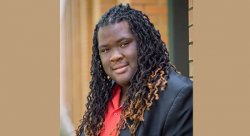Faculty Spotlight: Justice Studies Associate Professor Jason Williams
Posted in: Faculty Spotlight, Homepage News and Events, Justice Studies

Jason Williams, assistant professor, received a Ph.D in Administration of Justice from Texas Southern University. His research interests include: race, ethnicity and crime, criminological/criminal justice theory, critical criminology, critical policing, social control, criminal justice policy, qualitative methods, and the sociology of knowledge.
In addition to his research for the academic audience, Dr. Williams is involved in many public research and information forums enabling him to contribute to public criminology and scholarship. He has worked alongside the NJ Institute for Social Justice, helping to mobilize the community and legislative support for the eventual passage of NJ’s Restorative and Transformative Justice for Youths and Communities Pilot Program bill. Dr. Williams is a frequent contributor as a faculty expert to local and national news media outlets.
Tell us about your current research.
My research focuses on racialized and gendered social control. Some of my current work unpacks the daily realities of those cycling home from prison to their communities. In this work, I examine the racial, gendered and environmental impacts of mass incarceration. Moreover, I am also studying the impact of racialized policing, trying to understand marginalized communities’ experiences and perceptions of policing.
Talk about the importance of your work from your perspective as a humanities scholar or social scientist – Why does it matter for society? What makes it valuable to our students?
This research matters because it foregrounds lived experiences which is at the heart of the intersection that brings together the humanities and social sciences. Social sciences provides us the empirical framework through which to understand social phenomena, but the methodological implication from the humanities reminds us that the work we do have real-world impact. So my work is valuable to society and students because it pulls at one’s heartstrings, and forces them to imagine themselves as someone else. My work helps to build empathy which is a powerful and transformative emotion.
What makes your approach to teaching and research unique or innovative?
My work is innovative because I deploy methods that are nontraditional. Particularly in criminology, quantitative work dominates the field. However, my approach is the opposite. I prefer to use humanistic methodologies and frameworks in my work, such that the lived experiences of those whom I study are elevated and recognized as viable sources of knowledge. Also my teaching and research is deeply critical and mind bending, as I see it my purpose to challenge conventional ways of thinking and knowing.
Do you have a favorite course to teach?
I love teaching criminology. I like it because it is in the general education curriculum which also brings together students from various disciplines. It’s a complete joy teaching and learning with such a diverse array of students. In this course, students get to see just how infectious criminology is to our lives, and they leave with an understanding and appreciation for the discipline.
What’s your favorite thing about Montclair State?
I like the spirit of community and collaboration at MSU. I also like that diversity of opinion is valued on campus.
What are your hopes/goals for your students as they become the next generation of professional and engaged citizens of the world?
I hope my students will graduate with an extensive understanding of how to transform society’s institutions in ways that bring about equal and social justice for all.
